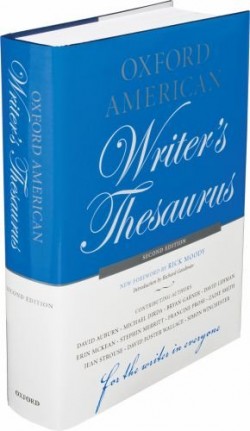 Some years back, Oxford University Press decided to bring out a new thesaurus. The Oxford American Writer’s Thesaurus would be alphabetical (rather than thematic, as Roget’s original had been), and it would include tables and inserts detailing the graded differences in connotation among groups of synonyms. Thus, on page 427 of the second edition, published in 2008, one finds a little box explaining the nuances distinguishing such similar words as “honor, deference, homage, obeisance” and “reverence.”
Some years back, Oxford University Press decided to bring out a new thesaurus. The Oxford American Writer’s Thesaurus would be alphabetical (rather than thematic, as Roget’s original had been), and it would include tables and inserts detailing the graded differences in connotation among groups of synonyms. Thus, on page 427 of the second edition, published in 2008, one finds a little box explaining the nuances distinguishing such similar words as “honor, deference, homage, obeisance” and “reverence.”
To further enhance the new thesaurus, the Oxford editors also asked 10 very different writers to contribute mini-essays on words they loved or hated. These pieces—on words ranging from “achingly” to “yump”—were consequently scattered throughout the OAWT, little oases of prose among all the word-lists. The lucky contributors included Zadie Smith, David Foster Wallace, Simon Winchester, Francine Prose, David Auburn, David Lehman, Erin McKean, Stephin Merritt, Jean Strouse, and me.
Sometimes when I use the thesaurus—and, like any shill on the radio, I do use this product myself—I sometimes wonder if fans of David Foster Wallace know about his contributions. He comments, for instance, on the following words: “all of,” “as,” “critique,” “dialogue,” “effete,” “feckless,” “fervent,” “focus,” “hairy,” “if” “impossibly,” “loan,” “mucous,” “myriad,” “privilege,” “pulchritude,” “that,” “toward, towards,” “unique,” and “utilize.” Here, for instance, is what he says about “pulchritude” (it appears appended to the entry on “Beauty”):
A paradoxical noun because it means beauty but is itself one of the ugliest words in the language. Same goes for the adjectival form pulchritudinous. They’re part of a tiny elite cadre of words that possess the very opposite of the qualities they denote. Diminutive, big, foreign, fancy (adjective), colloquialism, and monosyllabic are some others; there are at least a dozen more. Inviting your school-age kids to list as many paradoxical words as they can is a neat way to deepen their relationship to English and help them see that words are both symbols for things and very real things themselves.
What of my own favorites and bugaboos? I thought you’d never ask. There’s a run of them, from “brave” and “limn” to “Faulknerian” and “feisty,” this particular quartet tending to annoy me, for one reason or another. But here’s an entry in praise of “stippled”; it appears near the entry for “spotted.”
Stippled, flecked, dappled, variegated, speckled, spotted, pied, larded, dominoed, polka-dotted, brindled, freckled—all the words suggesting a mixture of light and dark strike me as one-word poems. Gerard Manley Hopkins called his great lyric about dappled things “Pied Beauty,” and to my ear such adjectives—and the condition they describe—seem homey, down to earth, essentially human. Nothing in our lives is pure and unalloyed; we love and we hate simultaneously, we act well and badly from one moment to the next. Our very souls are pieced together like old quilts or rag rugs.
That last sentence is rather poetic, if I do say so myself.
All of us, I suspect, have what I think of as “fallback” words. When I want an intensifier I often resort to “wonderfully,” as in “wonderfully inventive.” One of my fellow journalists struggles against over-using the phrase “That said” as a convenient way to transition into a new paragraph. When “embonpoint” appeared in one of my book reviews, it was passed over in silence; when it showed up again a week later, my colleagues never let me forget it. “Look at his embonpoint! Did you ever see such embonpoint? I’m not fat, I just have a lot of embonpoint.” I don’t think I’ve ever used the word since.
Still, I do turn to my thesaurus more and more these days. As my style leans toward the ascetically austere, I really do need the occasional striking word to give it a bit of pizzazz. Or do I mean razzle-dazzle? Or … You see what I mean.
In the past, the devout or the well educated would often retire for the evening with their Bible, the plays of Shakespeare, or similar improving works. The novelist Patricia Highsmith later adopted this same practice—but she read the dictionary. For half an hour after dinner. Sometimes I’ve wondered if even Hamlet might have been brushing up on his Elizabethan, thesaurus in hand, when Polonius asked him what he was reading and he answered: “Words, words, words.”
Maybe I should emulate the noble prince’s example. (How quickly fancies become facts!) Settle down in the evening with my trusty Oxford American Writer’s Thesaurus. Memorize a slew of new adjectives. Build up the old vocabulary. But somehow all this sounds more than a little pathetic. For now, at least, I think I’d prefer to spend the early evening with a glass of wine. Or since summer is fast upon us, a cold bottle of beer. Maybe two.

